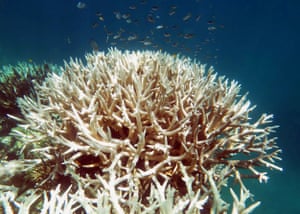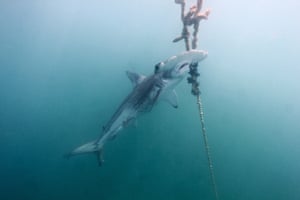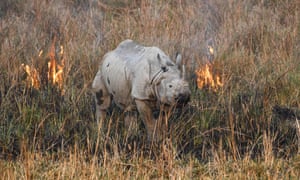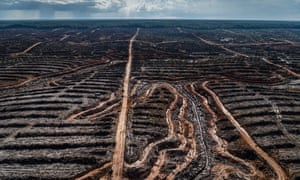Extract from The Guardian
Scientists reveal 1 million species at risk of extinction in damning UN report
Human society is in jeopardy from the accelerating decline of the
Earth’s natural life-support systems, the world’s leading scientists
have warned, as they announced the results of the most thorough
planetary health check ever undertaken.
From coral reefs flickering out beneath the oceans to rainforests desiccating into savannahs, nature is being destroyed at a rate tens to hundreds of times higher than the average over the past 10m years, according to the UN global assessment report.
The biomass of wild mammals has fallen by 82%, natural ecosystems have lost about half their area and a million species are at risk of extinction – all largely as a result of human actions, said the study, compiled over three years by more than 450 scientists and diplomats.

From coral reefs flickering out beneath the oceans to rainforests desiccating into savannahs, nature is being destroyed at a rate tens to hundreds of times higher than the average over the past 10m years, according to the UN global assessment report.
The biomass of wild mammals has fallen by 82%, natural ecosystems have lost about half their area and a million species are at risk of extinction – all largely as a result of human actions, said the study, compiled over three years by more than 450 scientists and diplomats.

“The health of the ecosystems on which we and other species depend is deteriorating more rapidly than ever. We are eroding the very foundations of economies, livelihoods, food security, health and quality of life worldwide,” said Robert Watson, the chair of the Intergovernmental Science-Policy Platform on Biodiversity and Ecosystem Services (Ibpes). “We have lost time. We must act now.”
The warning was unusually stark for a UN report that has to be agreed by consensus across all nations. Hundreds of scientists have compiled 15,000 academic studies and reports from indigenous communities living on the frontline of change. They build on the millennium ecosystem assessment of 2005, but go much further by looking not just at an inventory of species, but the web of interactions between biodiversity, climate and human wellbeing.
Over the past week, representatives from the world’s governments have fine-tuned the summary for policymakers, which includes remedial scenarios, such as “transformative change” across all areas of government, revised trade rules, massive investments in forests and other green infrastructure, and changes in individual behaviour such as lower consumption of meat and material goods.
Following school strikes, Extinction Rebellion protests, the UK parliament’s declaration of a climate emergency and Green New Deal debates in the US and Spain, the authors hope the 1,800-page assessment of biodiversity will push the nature crisis into the global spotlight in the same way climate breakdown has surged up the political agenda since the 1.5C report last year by the UN Intergovernmental Panel on Climate Change.

The report shows a planet in which the human footprint is so large it leaves little space for anything else. Three-quarters of all land has been turned into farm fields, covered by concrete, swallowed up by dam reservoirs or otherwise significantly altered. Two-thirds of the marine environment has also been changed by fish farms, shipping routes, subsea mines and other projects. Three-quarters of rivers and lakes are used for crop or livestock cultivation. As a result, more than 500,000 species have insufficient habitats for long-term survival. Many are on course to disappear within decades.
Eduardo Brondizio, an Ibpes co-chair from Córdoba National University in Argentina, said: “We have been displacing our impact around the planet from frontier to frontier. But we are running out of frontiers … If we see business as usual going forward then we’ll see a very fast decline in the ability of nature to provide what we need and to buffer climate change.”
Agriculture and fishing are the primary causes of the deterioration. Food production has increased dramatically since the 1970s, which has helped feed a growing global population and generated jobs and economic growth. But this has come at a high cost. The meat industry has a particularly heavy impact. Grazing areas for cattle account for about 25% of the world’s ice-free land and more than 18% of global greenhouse gas emissions. Crop production uses 12% of land and creates less than 7% of emissions.
Oceans are no longer a sanctuary. Only 3% of marine areas are free from human pressure. Industrial fishing takes place in more than half the world’s oceans, leaving one-third of fish populations overexploited.

Climate change, pollution and invasive species have had a relatively low impact, but these factors are accelerating. Emissions continue to rise. Last week, the amount of carbon dioxide in the atmosphere passed the 415 parts per million mark for the first time. Even if global heating can be kept within the Paris agreement target of 1.5C to 2C, the ranges of most species will shrink profoundly, the paper warns.
Population growth is noted as a factor, along with inequality. Individuals in the developed world have four times as much of an economic footprint as those in the poorest countries, and the gap is growing.
Andy Purvis, a professor at the Natural History Museum in London and one of the main authors of the report, said he was encouraged nations had agreed on the need for bitter medicine.

“This is the most thorough, most detailed and most extensive planetary health check. The take-home message is that we should have gone to the doctor sooner. We are in a bad way. The society we would like our children and grandchildren to live in is in real jeopardy. I cannot overstate it,” he said. “If we leave it to later generations to clear up the mess, I don’t think they will forgive us.”
The next 18 months will be crucial. For the first time, the issue of biodiversity loss is on the G8 agenda. The UK has commissioned Partha Dasgupta, a professor at Cambridge University, to write a study on the economic case for nature, which is expected to serve a similar function as the Stern review on the economics of climate change. Next year, China will host a landmark UN conference to draw up new global goals for biodiversity.

It says values and goals need to change across governments so local, national and international policymakers are aligned to tackle the underlying causes of planetary deterioration. This includes a shift in incentives, investments in green infrastructure, accounting for nature deterioration in international trade, addressing population growth and unequal levels of consumption, greater cooperation across sectors, new environmental laws and stronger enforcement.
Greater support for indigenous communities and other forest dwellers and smallholders is also essential. Many of the last holdouts for nature are in areas managed by such groups, but even here, the pressures are beginning to take a toll, as wildlife declines along with knowledge of how to manage it.
Josef Settele, an Ipbes co-chair and entomologist at the Helmholtz Centre for Environmental Research in Germany, said: “The situation is tricky and difficult but I would never give up. The report shows there is a way out. I believe we can still bend the curve.
“People shouldn’t panic, but they should begin drastic change. Business as usual with small adjustments won’t be enough.”

No comments:
Post a Comment